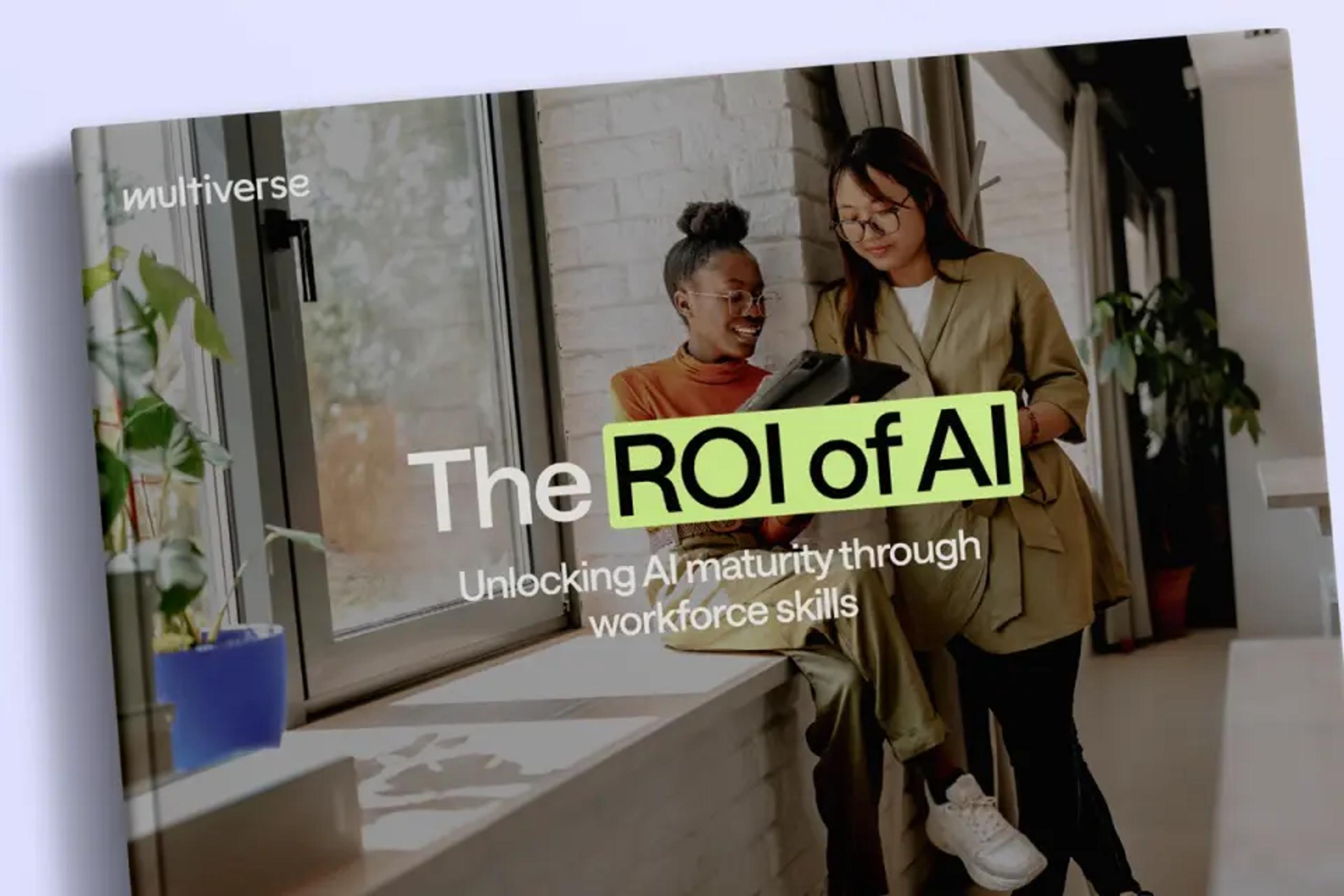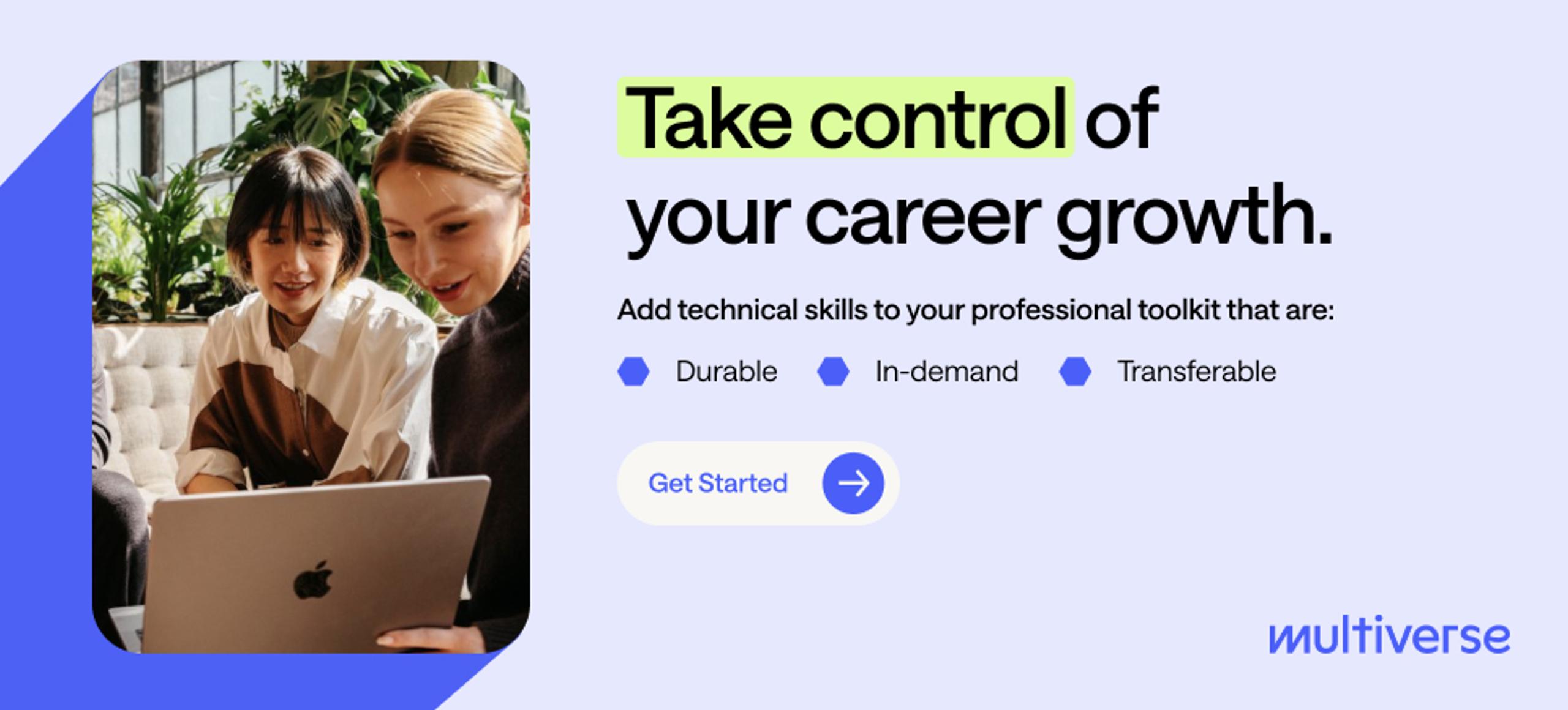The emergence of ChatGPT, GitHub Copilot, and other artificial intelligence (AI) tools is reshaping the U.K. job market. By 2027, 40% of professionals will need to reskill to adapt to AI and other emerging technologies. Business leaders estimate that 40% of their workers(opens new window) will have to reskill in the next 3 years due to AI.
U.K. professionals can use many resources to gain in-demand skills and advance their careers. For example, Multiverse’s tuition-free upskilling programs combine structured curricula with applied learning in the workplace. Upskillers can study AI, data analytics, transformative leadership, and other future-proof fields. Other effective strategies for upskilling include taking online courses and volunteering.
This guide explores the best ways to upskill in 2024. We’ll also highlight critical skills and emerging career opportunities to accelerate your professional journey.
Upskilling defined: Hard skills vs soft skills
Upskilling is a way to strengthen your core skill set and gain new knowledge related to your current career path. This process involves learning new best practices, methods, and technologies to adapt to industry changes.
People often confuse upskilling and reskilling, but they’re different processes. Upskillers expand their existing expertise to take on more advanced responsibilities and roles in their current fields. By contrast, reskillers learn new skills to pivot into different career paths or industries.
Upskillers typically focus on enriching two types of competencies: hard and soft skills.
Hard skills
Hard skills are the technical skills and knowledge needed to handle job-specific responsibilities and tasks. For example, Software Engineers must know how to use programming languages to write code for applications, while Data Scientists need a strong understanding of statistics to analyse datasets effectively.
The demand for hard skills has skyrocketed as industries increasingly become tech- and data-driven. However, many employers struggle to find employees with the right training. The British Chamber of Commerce’s June 2024 Business Barometer(opens new window) found that 62% of U.K. businesses face a skills shortage.
Upskillers can help meet this critical need by learning in-demand technical competencies and tools. According to the Robert Half 2024 Salary Guide(opens new window), the most sought-after technical skills in the UK labour market include:
- Cloud computing
- Data analytics
- Data management
- Financial modelling
- Marketing automation
- Programming languages
- Software engineering
Soft skills
Soft skills are behaviours and interpersonal abilities that enable professionals to build relationships and navigate complex workplace dynamics. Workers use these skills to collaborate, lead teams, and resolve conflicts effectively.
A 2024 LinkedIn survey(opens new window) shows that 90% of U.K. employers value soft skills more than educational qualifications. Here are a few of the most in-demand soft skills:
- Communication
- Customer service
- Management
- Leadership
- Teamwork
- Project management
- Problem-solving
These universal skills transfer across many industries and roles. For instance, Product Managers and Marketers both need strong communication skills to coordinate cross-departmental projects.
How to assess your hard and soft skills
Evaluate your existing skill set to understand your strengths and identify opportunities for upskilling.
Start by self-reflecting on your current abilities and areas of expertise. What skills have you used in your current and past roles? What areas do you excel in, and where would you like to improve?
As you answer these questions, create a list of your hard and soft skills. Consider rating each skill as “Advanced,” “Proficient,” “Developing,” or “Needs Improvement.” This exercise allows you to assess your current abilities and detect areas where you could build your expertise.
Next, ask trusted colleagues and mentors for feedback on your performance and skills. Invite them to share their observations about your strengths and areas for growth. These conversations can help you evaluate your abilities objectively and gain fresh insights into the skills that matter most in your field.
Finally, consult job profiles on LinkedIn, Indeed, and other career boards to learn about the necessary qualifications and skills for your career path. Compare these competencies to your existing skill set to identify gaps and focus on these areas during your upskilling journey.
Upskilling and the jobs of the future
Professionals have always needed to upskill throughout their careers, but recent technological advancements have made this process more critical than ever.
Businesses across industries have increasingly embraced AI, automation, data science, and other innovations. This shift has profoundly disrupted the U.K. job market, with many traditional roles evolving or becoming obsolete. The Institute for Public Policy Research(opens new window) predicts that AI could affect the jobs of up to 8 million U.K. professionals in the next few years.
Upskillers can prepare for this shift by strengthening their digital fluency. Employers in all sectors seek candidates with proficiency in AI, data analysis, and emerging technologies, even outside traditional tech roles. For example, Marketers can use AI to generate content and automatically send emails. Developing these skills will help you drive innovation in your organisation and increase your marketability.
Upskilling can also unlock exciting career opportunities in emerging fields. According to a 2024 LinkedIn report(opens new window), the fastest-growing jobs in the U.K. include:
- Sustainability Manager
- Sales Development Representative
- Underwriting Analyst
- Chief Revenue Officer
- Dental Therapist
- Home Health Aide
- Artificial Intelligence Engineer
Many of these roles require cutting-edge technical skills. For instance, Sustainability Managers must analyse environmental data, while Artificial Intelligence Engineers need proficiency in deep learning and machine learning algorithms. Continuous upskilling will enable you to future-proof your career and pursue leadership roles in these high-growth fields.
How to upskill in 2024
U.K. professionals can take advantage of many upskilling resources, from short YouTube tutorials to 18-month apprenticeships. The most effective upskilling opportunities focus on career-ready skills and allow you to practise applying your knowledge in real-world scenarios.
Digital learning and flexible courses
Online courses and certifications allow upskillers to acquire hard skills without the financial commitment of attending university. Platforms like Coursera and LinkedIn Learning offer online courses on various skills, such as data visualisation, prompt engineering, and user experience (UX) design.
Digital learning allows students to study countless topics at their own pace without commuting to campus. This flexibility and versatility make this approach ideal for busy professionals.
Volunteering and practical experience
Volunteering allows you to gain valuable hands-on experience while giving back to your community. Look for opportunities that enable you to gain relevant hard and soft skills as you contribute to meaningful causes.
For example, you could strengthen your JavaScript skills by developing a website for a local homeless shelter. Similarly, you might learn digital marketing by running social media campaigns for a food bank. These activities can boost your career progression and help you build a portfolio to show potential employers.
Upskilling on the job
Multiverse’s upskilling programmes allows professionals to gain new skills while working at their current roles. Upskillers expand their knowledge by attending live workshops, collaborating with peers, and completing virtual modules. They also gain hands-on experience by applying their newfound skills in their current roles.
Multiverse learners develop in-demand AI, business, data, and tech skills. For example, one apprentice used the tech skills he gained during his apprenticeship to launch a charity platform and secure a Project Manager job. Meanwhile, Jeffrey Owusu was promoted to a senior management role during his apprenticeship and helped his colleagues improve their productivity. These case studies demonstrate how Multiverse empowers professionals to make valuable impacts in their organisations and advance their careers.
Creating a SMART career plan
Follow the SMART framework as you shape your career development plan. This roadmap should include these elements:
- Specific: Set clear, short-term goals for consistent growth.
- Measurable: Identify specific metrics and milestones to track your progress.
- Achievable: Create a realistic plan that won’t interfere with your existing job, family responsibilities, and other commitments.
- Relevant: Choose upskilling activities that directly contribute to your career goals.
- Time-bound: Establish fair deadlines to meet milestones and goals.
Update your resume or CV frequently as you complete learning experiences and projects. This practice will allow you to track your skill development and stay prepared for unexpected job openings.
Why Multiverse is the best way to upskill in 2024
A Multiverse apprenticeship is the most effective way to upskill and future-proof your career. Our innovative programs combine practical experience with personalised coaching and industry-recognized certifications.
Apprenticeships receive hands-on training in high-demand fields, including:
- Advanced Software Engineering - Deepen your knowledge of cloud computing, data engineering, machine learning, and other advanced topics.
- Data Fellowship - Strengthen your data analysis and visualisation skills.
- AI for Business Value - Apprentices learn how to leverage AI responsibly to drive business outcomes and accelerate their careers in the workforce of tomorrow.
These flexible learning pathways allow professionals to upskill without sacrificing their current job or work-life balance. Depending on the programme, apprentices often receive several hours of protected learning time each week and apply their skills by completing relevant projects for their employers. They also get personalised coaching and mentoring to support their professional development.
A Multiverse apprenticeship can lead to rapid career growth. One in three learners get promoted during their apprenticeship or within six months of completion. Additionally, 52% of learners saw a salary increase since starting the program.
Accelerate your professional growth
Upskilling has become a necessity in 2024 as industries race to adapt to emerging technologies and changing market demands. Professionals must continuously expand their hard and soft skills to meet new challenges and stay relevant.
U.K. workers can pursue many upskilling opportunities, including online courses, certifications, and volunteering. Consider Multiverse’s upskiller programs if you’re looking for a structured, career-advancing upskilling experience – with no cost to participants. Apply today to get started(opens new window).










